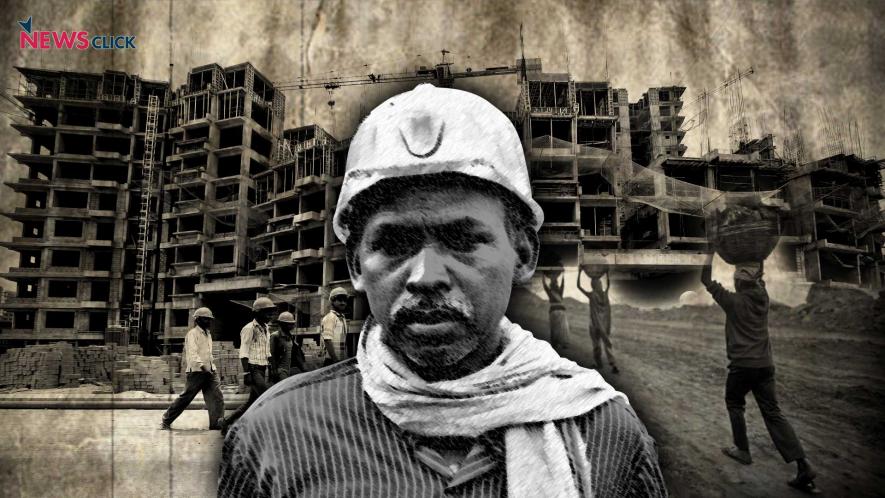Trade Unions Reject the Wage Code Bill 2017

Newsclick Image by Nitesh Kumar
The Labour Ministry introduced the Code on Wages Bill 2017 in the Lok Sabha on August 10, with the ostensible aim of ensuring a statutory national minimum wage and other protections to all wage workers in the country.
The Code seeks to replace the four existing laws relating to wages – the Payment of Wages Act, 1936; the Minimum Wages Act, 1948; the Payment of Bonus Act, 1965; and the Equal Remuneration Act, 1976.
But the Bill is drawing strong opposition from trade unions across the country, which point out that it is actually diluting whatever pro-labour elements existed in the four earlier legislations.
Newsclick looks at some of the main anti-worker components in the Wage Code Bill.
The first obvious problem is that the Bill makes a mockery of the idea of a ‘national minimum wage’ by providing for different national minimum wages to be fixed for different states – instead of providing for a uniform national minimum wage for the entire country.
This is despite the Labour Ministry proclaiming its intention to improve the wage levels and ensure a minimum living standard to workers by fixing a national minimum wage, below which no state government can fix its minimum wage.
But Section 9(1) of the Bill states that ‘different national minimum wage may be fixed for different states or different geographical areas’.
Hence, the ‘national minimum wage’ – even as the phrase is repeatedly used – is reduced to a ‘state-level minimum wage’.
As the Centre for Indian Trade Unions (CITU) states in a document critiquing the Code on Wages Bill 2017, this makes “the whole concept of ‘National Minimum Wage’ a deceptive ploy to mislead the people.”
“Even if the difference in price level in different states/geographical areas is taken into account, it can well be reflected in the rates of variable dearness allowances, as it exists now. There is no justification of making ‘national minimum’ of the basic minimum wage different for different states,” notes CITU.
“Hence the provision of ‘national minimum wage’ being projected by the government as an improvement in the present Bill is rendered meaningless for the workers by the provision of the Bill itself.”
Further, as a memo on the Labour Code of Wages Bill 2017 by the New Trade Union Initiative (NTUI) points out, this could lead to a “race to the bottom” among states to lower wages.
“The underlying competitive federalism inherent in this shift of responsibility severely dilutes the concurrent nature of ‘labour’ as outlined in Article 246, Schedule 7 of the Constitution. This will also lead to competition between states to lower wage standards and lead to a race to the bottom, which negatively impacts growth owing to reduced effective demand.”
The other overriding problem is the matter of the fixation of the minimum wage.
Dr K Hemalata, president of CITU, told Newsclick, “The government has completely ignored the formula for fixing the minimum wage as was recommended by the 44th Indian Labour Conference (ILC) in 2012, and reiterated by the 46th ILC in 2015, which was even inaugurated by Prime Minister Narendra Modi. This formula for minimum wage was adopted unanimously by the 15th ILC in 1957 and by the Supreme Court directions in the Raptakos and Brett case.”
Based on this formula, the Seventh Pay Commission recommended Rs 18,000 as minimum wage. The government accepted this for central government employees.
Trade unions are demanding the same minimum wage of Rs 18,000 per month for all workers. But the Wage Code Bill does not provide for that. In fact, the government was quick to deny that it had any intention to fix a Rs 18,000 monthly minimum wage.
The country’s central trade unions have already planned a three-day dharna from November 9 to 11 in front of the Parliament in Delhi Street, to be followed by the indefinite country wide strike, against the anti-labour policies of the NDA government. They are demanding the adoption of a 12-point Charter of Demands put forward by them, which includes the issue of minimum wages.
“The formulation of minimum wage has been kept under the sole discretion of the government,” notes CITU.
“Although the provision of Advisory Board is there both at state and central level, the Bill does not make even the recommendation of the Advisory Board mandatory for the state and central governments while deciding minimum wage,” as CITU further points out.
Another concern is that the Code has removed the Schedule of Employment, which lists the industries governed by labour laws.
“Now industry-specific wage setting is shifted to standardized minimum wages for time and piece-work. This will likely result in minimum wage thresholds fixed according to the wages paid to the poorest workers. (Although the Schedule was exclusionary and needed to be inclusive, its elimination creates a race to the bottom),” notes the NTUI memo.
And as CITU states, “Does it mean that the minimum wages, to be decided by either state or central government, will be the same for all industries? There is no answer. Rather this is a ploy to empower employers to suppress the wages in the establishments/industries in the erstwhile schedules where wage level was higher than the others. All for ensuring ‘ease of doing business’ in an unscrupulous manner.”
Moreover, the Code significantly weakens the Equal Remuneration Act, one of the four laws it seeks to replace.
CITU states, “The Equal Remuneration Act has been completely diluted by restricting it to gender discrimination only in respect of payment of wages, doing away with other types of discrimination related to recruitment, conditions of service such as promotion, vocational training, transfer etc.”
Similarly, NTUI says, “The entire Equal Remuneration Act, 1976 has been limited to one section in the code, referring to as “Prohibition of discrimination on ground of gender”. This removes all penalties and violations contained in the principal act... The Code also reduces participation of women in the Central Advisory Board for Minimum Wages from 50% to one third.”
Significantly, the Code seeks to render trade unions toothless in a number of ways.
For one, the Code does away with the right of trade unions to legally access the audits of the establishment’s accounts.
“The right of the workers or their unions to question the accuracy of the balance sheet of the company or demand clarifications, to ascertain ‘allocable surplus’ while bargaining for bonus above the minimum level, which is available in the present Bonus Act is totally done away with in the proposed labour code on wages as per section 31(2) wherein it has been stated that ‘Audited accounts of companies shall not normally be questioned’,” notes CITU.
“It also empowers the employers not to enclose any information contained in the balance sheet, if they so want. This is nothing but abrogation of workers’ right to collective bargaining in respect of bonus by the government.”
The Code also deems workers who are participating in a strike to be absent.
The Code further restricts the functioning of trade unions and workers’ organisations as “it limits the scope of trade union members forming independent funds for their own welfare or other activities; removes right of trade unions to legally access audited accounts and balance-sheets of employers and limits possibility of scrutinizing the financial claims of the employer,” states NTUI.
As for revision of the minimum wages, the Code sets five years as the standard time for wages to be revised, while currently five years is the maximum period for the revision of wages.
Get the latest reports & analysis with people's perspective on Protests, movements & deep analytical videos, discussions of the current affairs in your Telegram app. Subscribe to NewsClick's Telegram channel & get Real-Time updates on stories, as they get published on our website.























